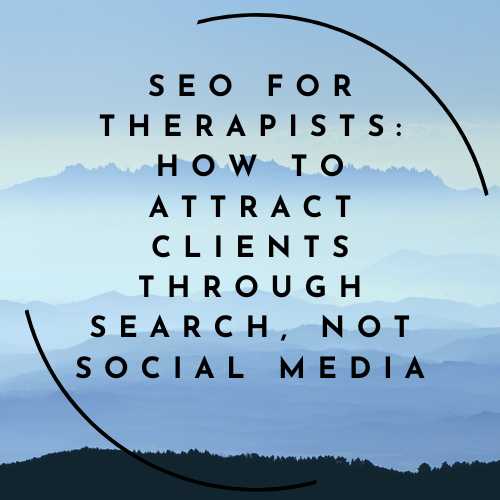Many therapists feel pressured to market themselves on social media, spending hours crafting Instagram posts or engaging in Facebook groups—only to see little return on investment. Social media algorithms change constantly, requiring a constant stream of content to stay visible. Worse, many therapists feel burnt out by the performative nature of social media, where therapy gets condensed into bite-sized, viral moments rather than meaningful, nuanced discussions.
There’s a better way: Search Engine Optimization (SEO).
Instead of fighting for fleeting attention on social media, SEO ensures that clients actively searching for therapy find YOU. When someone in your city types “trauma therapist near me” or “how to know if I need therapy” into Google, your website should be one of the first results they see.
This isn’t just about ranking higher. It’s about showing up at the exact moment when someone is looking for help—which is far more powerful than a social media post that disappears in hours.
Learn More About My Writing Services for Therapists
How SEO Works for Therapists (And Why It’s Different from Other Businesses)
SEO isn’t just about stuffing keywords onto your website—it’s about understanding how potential clients search for therapy and meeting them where they are.
Unlike an online store that might optimize for “best hiking boots”, a therapist’s website needs to consider:
✔ Client Intent: Someone searching for “depression therapist in Austin” isn’t casually browsing—they’re likely ready to book a session. Your site needs to immediately reassure and guide them.
✔ Emotional Connection: Clients searching for therapy are often in distress. Google ranks content that demonstrates expertise and trustworthiness, meaning your bio, blog posts, and service pages must feel safe, informative, and approachable.
✔ Privacy Considerations: Many clients won’t engage on social media due to privacy concerns. They’re more likely to search privately on Google than comment on a Facebook post about anxiety.
SEO lets you skip the noise and meet clients in the moments that matter most.
SEO Strategies That Work Specifically for Therapists
If your website isn’t bringing in consistent client inquiries, these are the most effective ways to improve your SEO:
1. Target the Exact Phrases Clients Are Searching For
Many therapist websites focus on clinical language that doesn’t match what potential clients are actually Googling.
Example: The Wrong Approach
❌ “I offer psychodynamic and attachment-based approaches to emotional dysregulation.”
Example: The SEO-Optimized Approach
✅ “I help adults struggling with anxiety, overthinking, and self-doubt feel more confident and at ease.”
How to Find the Right Keywords:
- Use Google Autocomplete – Start typing phrases like “how to deal with…” and see what Google suggests.
- Check People Also Ask in Google results – These are real questions clients are searching for.
- Look at competitor therapist websites that rank well—what language are they using?
Examples of High-Converting SEO Keywords for Therapists:
- “How do I know if I need therapy?”
- “What does therapy for childhood trauma look like?”
- “Therapist for highly sensitive person near me”
- “Cognitive Behavioral Therapy vs. EMDR”
Integrating these into your blog, FAQs, and service pages naturally improves your rankings.
2. Use Location-Based SEO to Attract Clients in Your Area
Most therapists work locally, yet many fail to optimize their site for local SEO.
✔ How to Fix It:
- Include your city and state on every page (e.g., “I provide anxiety therapy in Portland, Oregon.”).
- Add a separate page for each specialty (e.g., “CBT Therapy for Anxiety in Chicago”) to rank for multiple searches.
- Claim and optimize your Google Business Profile—this helps you appear in Google Maps results and “near me” searches.
Clients almost always search for therapists near them, so location-based SEO is crucial.
3. Write Blog Content That Ranks on Google
A static website doesn’t perform well in search rankings. Google favors fresh, relevant content—which is why therapists with blogs rank higher.
What Kind of Blog Posts Should Therapists Write?
Instead of vague or overly technical content, write blog posts that answer real client questions:
✔ “5 Signs You Might Benefit from Therapy (And What to Expect in Your First Session)”
✔ “How to Cope with Anxiety Between Therapy Sessions: Techniques That Work”
✔ “EMDR vs. Talk Therapy: Which One is Right for You?”
Why This Works:
- These posts match what clients are actually searching for.
- Each post reinforces your expertise and builds trust.
- More pages = more chances for Google to rank your site higher.
💡 Pro Tip: End each blog post with a clear call to action—like: “Ready to explore therapy? Contact me today for a free 15-minute consultation.”
READ: Why Blogging Is the Most Powerful Tool for Promoting Your Therapy Practice
4. Optimize Your Website’s Speed & Mobile Friendliness
A slow website = lost clients. Google penalizes slow-loading websites, and potential clients won’t wait for a page to load.
✔ How to Fix It:
- Use a clean, modern website design with minimal clutter.
- Optimize images and videos to load faster.
- Test your website speed with Google PageSpeed Insights and make improvements.
Since most searches now happen on phones, your site must be mobile-friendly. If a client can’t easily click your contact form on their phone, they’ll leave.
5. Use Internal & External Links to Strengthen Your SEO
🔗 Internal Links: Guide visitors to other pages on your website (e.g., linking a blog post on anxiety to your “Anxiety Therapy” page).
🌍 External Links: Link to credible sources like the APA or NIMH—this boosts your site’s authority in Google’s eyes.
Google ranks interconnected sites higher, so smart linking is a must.
Learn more about the best therapist websites.
SEO is the Best Investment for Your Practice
Instead of spending hours chasing engagement on social media, invest in SEO strategies that bring clients to you—without the burnout.
✔ SEO helps you attract high-quality clients who are already looking for therapy.
✔ It builds long-term credibility & visibility—unlike social media posts that disappear.
✔ It reduces reliance on paid ads—allowing for consistent client inquiries without extra spending.
Want to Improve Your SEO & Get More Clients?
I specialize in SEO-optimized content writing for therapists, ensuring your website:
✅ Ranks higher on Google
✅ Attracts the right clients
✅ Converts visitors into inquiries

